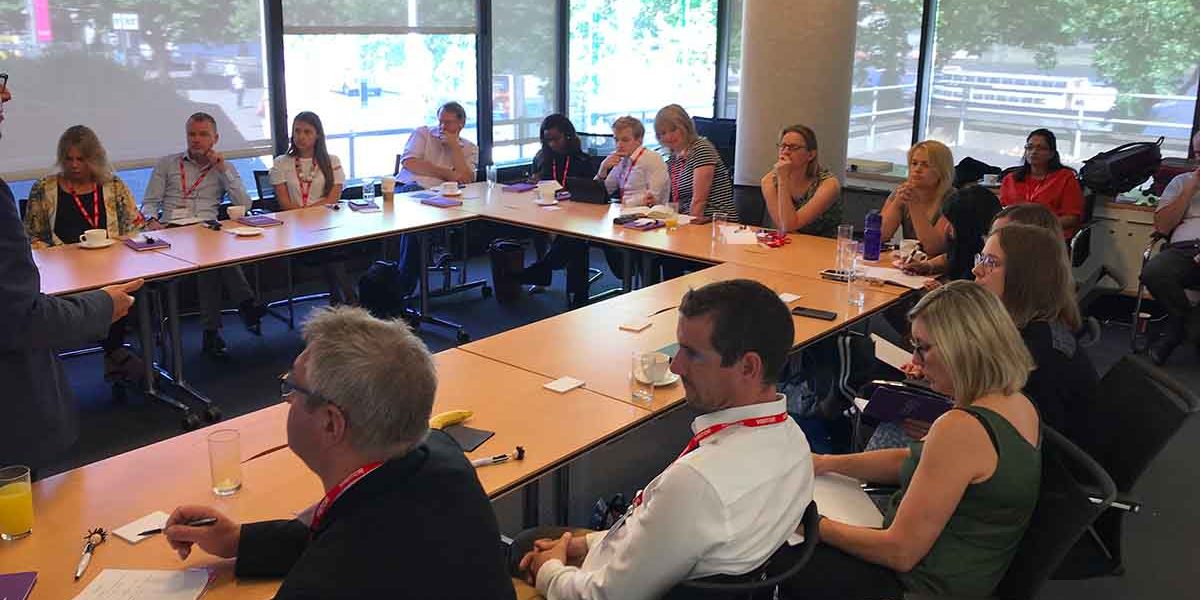Wednesday 27th June 2018 saw the HR community come together for the 5th Tap’d HR Forum. This regular event on the UK calendar was based in London and this time looked at “Future Leaders and the case for Diversity”.
Our speakers were Dave Millner, the HR Curator, and Alice Chilver, Founder of WHEN – Women in Higher Education Network.
Anthony Ryland, MD of Tap’d, opened the session with some background to why we were talking about leadership and diversity in the same Forum. He explained that diversity was an issue at the forefront of the media at the moment and businesses were finally being held to account by the public and shareholders to address this issue. However, it is line management that can use this diversity of people and thinking to create inclusive teams where ongoing diversity of the team can flourish.
He went on to talk about how the challenge of leaders to drive engagement and motivation was to become more difficult with the dispersion of teams that can now happen through technology and the rise of co-working spaces like Wework, where your co-workers may not work for the same organisation as you and your manager is remote.
Anthony handed over to Dave Millner, the HR Curator, who focused on the Future of Leaders.
Dave opened with a great phrase that “The world will never be this slow again!” emphasising that those leaders who are struggling with the pace of change now will find it even harder in the future unless we change our leadership approach. Managers will be managing machines in the future, as a number of repetitive human roles will merge with machines with a blur around the job description boundary between the human and the machine.
Dave said that a new kind of strategy was needed called the “Ambidextrous Organisational Strategy” – a more flexible approach to strategy due to the rate of change in the world, replacing the 5 to 10 year plans. Leaders can no longer rely on the “analogue mindset” and need to think of new ways to deal with the digital work challenges that face them in the future. One example was that organisations are putting a lot of engagement activities in place, but they are still essentially “command and control”. Yet the real engagement happens in a much more flexible way within the localised teams, with leaders at the core to make or break this engagement. We need to put the control in the hands of the leaders.
Dave explained that there was a new leadership framework to support leaders in developing their behaviours and style, which is relevant to the future workplace. He cited the IBM Leadership framework of:
- Creating Strategy
- Engaging Talent
- Inspiring People
- Achieving Excellence
Dave focused on the two parts of the framework which studies show leaders are consistently poorer at: Engaging and Inspiring.
Workforce expectations are changing and need to change. It is the balance between engagement versus experience. Engagement is a “view” of the organisation and experience is a view or the individual’s job/role. The leader is at the heart of the employee experience which linked back to Anthony Ryland’s intro when he talked about “Macro and Micro Engagement”.
Dave finished by asking the delegates for their view on what HR can do to support leaders in the future. Through an energy filled discussion ideas flowed, from working with leaders as “co-creators” and stopping being the “solutions factory”, to making sure HR is skilled-up to be able to support leaders through knowledge and coaching skills. Other topics included ensuring the most senior leaders are role models and using technology. The best leaders continue to learn and in the ever-changing future this adaptability would be key to great leadership.
After a great networking break, Alice Chilver continued with a focus on the case for diversity and its link to performance and leadership.
Alice opened with some research by IBM about the business case for Diversity and Inclusion. The research showed that a strong diversity strategy could yield:
- Half employee turnover
- 2 x collaboration in the business
- 3 x the level of creativity
- 4 x the amount of innovation
However, Alice informed us that the gender pay gap is 14.1% in Higher Education and at the current rate it will never be closed. But it’s not just about gender, the area of intersectionality is often overlooked (See Blog by Evie Samuel). Often the focus is on one area of diversity in isolation and not people who are in more than one group.
The higher education has an accreditation called Athena Swan which is like a kite mark for diversity activities that shows a university with a detailed diversity focus. Alice went on to share how UCL worked on these criteria to develop an action plan with ownership spread throughout the university to gain traction.
Alice then held a discussion within small groups around what was working well in the delegates’ organisations and what they could take away from the forum to start doing from tomorrow in their businesses. This generated a lot of ideas which were shared within the group at the end of the session.
We must say thank you to Dave Millner and Alice Chilver for giving up their time for the Tap’d HR Forum delegates.
If you are interested in attending one of our Tap’d HR Forums then please subscribe on our website to our mailing list. We also run webinars and have a podcast channel called “Tap’d Talks HR”.
We look forward to seeing you at a future event.
Anthony Ryland and Alex Pegg

